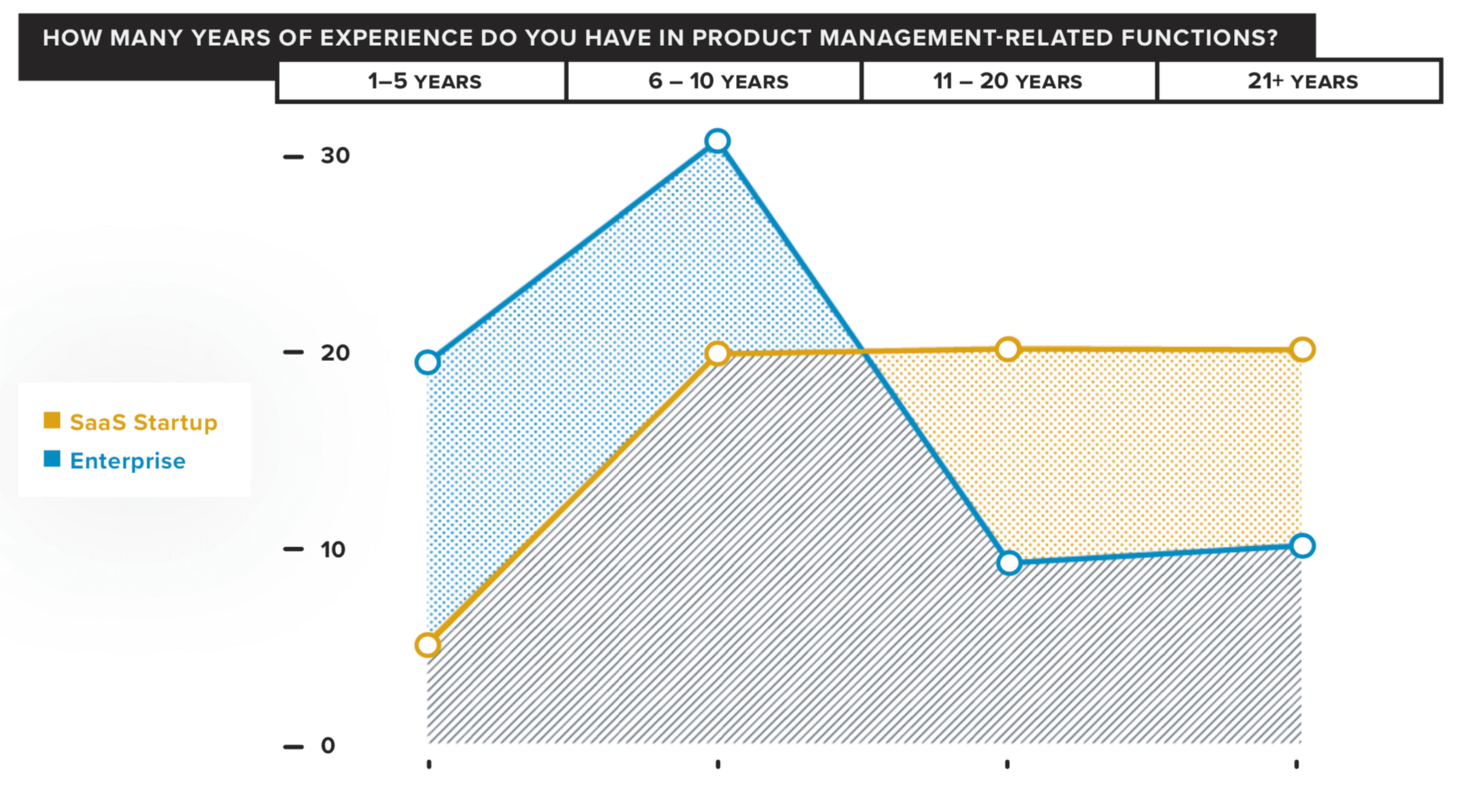Does bigger necessarily mean better when it comes to product management? Do global enterprise companies really have the advantage over SaaS startups?
These are a few of the questions our colleagues at Pendo had in mind as they crafted their annual product management survey. Hundreds of product practitioners completed it and their responses revealed some interesting differences between enterprise PMs and those at SaaS startups. Both types of companies have their own approaches to product management, and the average PM at an enterprise is a bit different from one at a SaaS startup.
Traditionally, one would think of the “battle” between enterprise and startup PMs as a “David and Goliath” type of story. But that isn’t what the data says. While global enterprises have more resources and brand recognition at their disposal, many startups’ “weaknesses” can actually be advantages when it comes to product management. And more and more, the big guys are looking to the scrappy, small ones for insights into how to become leaner, foster creativity and innovation, and hire the best people.
So, where are these differences most apparent? Let’s take a look at three of the areas where enterprise and SaaS startup PMs are the least alike.
Salary and Career Path
Here’s a question for you. Which PM gets paid more: the one at a global enterprise, or the one at a SaaS startup? And here’s another: Which of those PMs has more years of experience?
If you answered “global enterprise,” we can’t really blame you. That was our initial guess as well. However, it’s incorrect.
In fact, this was one of the most unexpected results of Pendo’s annual PM survey. While enterprise PMs are most likely to have between six and ten years of experience (46%), SaaS product managers are most likely to have between 11 and 20 years of experience (32%). And the second-largest cohort of SaaS startup PMs had over 21 years of experience (30%)! The second-largest cohort for enterprise PMs? Those with between one and five years of experience (27%).
So, why is this the case? Part of the answer has to do with salary. SaaS startup PMs are most likely to earn between $150,000 and $200,000 annually, while enterprise PMs are most likely to make a salary in the $100,000-$125,000 range.
Organizational Alignment
As product management has grown in popularity and influence, product teams have taken on more independence within the organization. In the past, product was more likely to report to a head of marketing or engineering than a head of product. And the CPO title, once a rarity, is now showing up frequently on org charts at both enterprise and startup companies.
And this is especially clear at enterprise companies. PMs at enterprises are most likely to report to a dedicated product team (31%). They’re least likely to report to an individual line of business. In contrast, SaaS startup PMs are most likely to report to an individual line of business (32%) and least likely to report to a dedicated product team. Marketing and engineering fall in the middle for both categories.
This exemplifies a larger finding from the PM survey results. In general, enterprise product managers are more “introverted” (internal-facing) in their product management approach, while SaaS startup PMs are more “extroverted.” Perhaps this is unsurprising since SaaS startup PMs are more likely than enterprise PMs to have a background in marketing.
Effectiveness
Pendo’s annual survey asked respondents to rate their performance in different categories on a scale from 1 to 5, where 1 = underperforming competitors and 5 = outperforming competitors. Overall, enterprise product managers consider themselves more effective than do SaaS startup PMs. However, enterprise and startup PMs vary in which job areas they consider themselves “best” at.
SaaS startup PMs, for example, think their top area of advantage over competitors is driving feature adoption, while enterprise PMs see theirs as driving revenue. The second biggest advantage for SaaS startup PMs is receiving high customer satisfaction and NPS ratings. For enterprise PMs, the second biggest advantage over competitors is product/feature/roadmap delivery. Again, we see the effects of the “introverted” versus “extroverted” approaches to product management. Both groups of PMs, however, cited retention and churn as the area where they have the smallest competitive advantage.
Want to read more about how PMs differ by company size? Check out the full “Battle of the PMs Part II: The SaaS Startup vs. the Global Enterprise” e-book, which also includes a discussion of the areas where enterprise and startup PMs are the most similar.

![[object Object]](https://cdn.builder.io/api/v1/image/assets%2F6a96e08774184353b3aa88032e406411%2F16b6f2565d1d4a5585db322386f9be7f?format=webp)
![[object Object]](https://cdn.builder.io/api/v1/image/assets%2F6a96e08774184353b3aa88032e406411%2F728d67faa5f64299b8f8f0b138881fb5?format=webp)
![[object Object]](https://cdn.builder.io/api/v1/image/assets%2F6a96e08774184353b3aa88032e406411%2Fc08c4160a2724c4fa3d365eb43791b09?format=webp)

